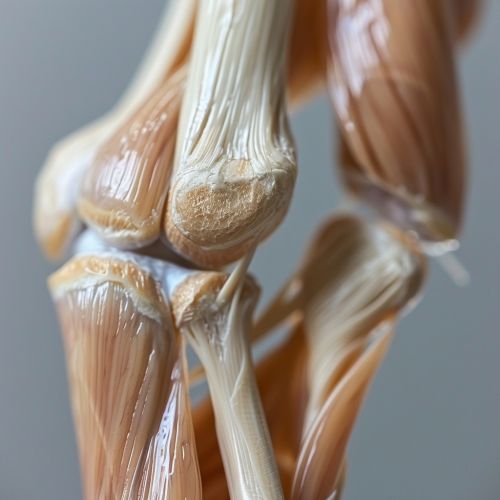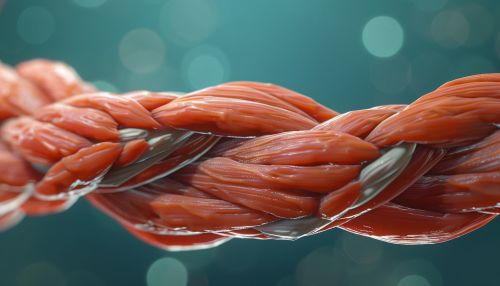Tendon: Difference between revisions
No edit summary |
No edit summary |
||
| Line 2: | Line 2: | ||
A [[tendon]] is a tough band of fibrous connective tissue that usually connects muscle to bone and is capable of withstanding tension. Tendons are similar to ligaments and fasciae as they are all made of collagen. Tendons and muscles work together and can only exert a pulling force. | A [[tendon]] is a tough band of fibrous connective tissue that usually connects muscle to bone and is capable of withstanding tension. Tendons are similar to ligaments and fasciae as they are all made of collagen. Tendons and muscles work together and can only exert a pulling force. | ||
[[Image:Detail-79131.jpg|thumb|center|A close-up view of a tendon connecting muscle to bone]] | [[Image:Detail-79131.jpg|thumb|center|A close-up view of a tendon connecting muscle to bone|class=only_on_mobile]] | ||
[[Image:Detail-79132.jpg|thumb|center|A close-up view of a tendon connecting muscle to bone|class=only_on_desktop]] | |||
The structure of a tendon is composed of dense regular connective tissue, which consists of closely packed, parallel collagen fibers. These fibers are produced by fibroblasts, the most common cells of connective tissue in animals. The dense regular connective tissue is surrounded by a layer of dense irregular connective tissue, the epitenon, which protects the inner structure of the tendon. | The structure of a tendon is composed of dense regular connective tissue, which consists of closely packed, parallel collagen fibers. These fibers are produced by fibroblasts, the most common cells of connective tissue in animals. The dense regular connective tissue is surrounded by a layer of dense irregular connective tissue, the epitenon, which protects the inner structure of the tendon. | ||
Latest revision as of 07:04, 17 May 2024
Anatomy and Structure
A tendon is a tough band of fibrous connective tissue that usually connects muscle to bone and is capable of withstanding tension. Tendons are similar to ligaments and fasciae as they are all made of collagen. Tendons and muscles work together and can only exert a pulling force.


The structure of a tendon is composed of dense regular connective tissue, which consists of closely packed, parallel collagen fibers. These fibers are produced by fibroblasts, the most common cells of connective tissue in animals. The dense regular connective tissue is surrounded by a layer of dense irregular connective tissue, the epitenon, which protects the inner structure of the tendon.
Function
Tendons primarily serve to transmit the mechanical force of muscle contraction to the bones; thus, the tendon functions to move the bone. Because of their high tensile strength, tendons help to stabilize joints and maintain the body's alignment and posture. They also play a crucial role in proprioception, the body's ability to sense its location, movements, and actions.
Healing and Repair
Tendon healing is a complex process and can be divided into three stages: inflammation, repair, and remodeling. During the inflammation stage, cells called leukocytes and macrophages are activated to remove damaged tissue. The repair phase involves the synthesis of Type III collagen, which is gradually replaced by Type I collagen during the remodeling phase. This process can take several weeks to months and the repaired tendon will always have a lower tensile strength than a normal tendon.
Pathology
Tendon injuries, known as tendinopathies, are common in athletes and in people who perform repetitive activities. These injuries can be caused by overuse, improper form during physical activity, or aging. Tendinopathies can be classified into tendinitis and tendinosis. Tendinitis is inflammation of the tendon, while tendinosis refers to chronic tendon injuries with degenerative changes in the tendon.
